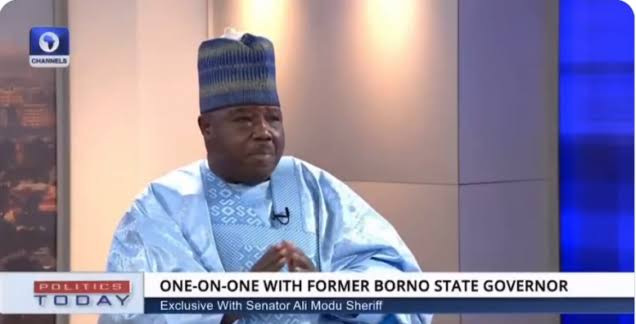Ali Modu Sheriff, a former Governor of Borno State and senior figure in the All Progressives Congress (APC), has publicly described Nyesom Wike, the Minister of the Federal Capital Territory (FCT), as a “rascal” while simultaneously acknowledging his effectiveness in office. Sheriff made the remarks during an interview on Politics Today, a program aired by Channels Television, on Monday.
Despite expressing personal disapproval of Wike’s behavior, Sheriff emphasized that he overlooks the minister’s temperament due to his visible contributions to the development of Abuja. According to Sheriff, Wike’s performance stands out among federal cabinet members, many of whom he accused of underperforming or misleading the public.
“I’m not a fan of Wike. Wike’s character is that of a rascal, but you cannot take away from him that he has changed Abuja,” Sheriff stated during the broadcast. He continued, “From the time Abuja was created up to this moment, nobody has worked like him.”
Sheriff stressed that some ministers under President Bola Ahmed Tinubu’s administration are not living up to expectations. Without naming them, he claimed that several ministers have failed to deliver results and are instead focused on creating false impressions about their work.
“There are ministers that are not working but lying to Nigerians. It is not the president’s problem,” he said, making a distinction between the performance of individual ministers and the leadership of President Tinubu.
In the same interview, Sheriff shifted focus to matters of national security, particularly the persistent Boko Haram insurgency in northeastern Nigeria. He called for a strategic regional approach to addressing the insurgency, urging stronger cooperation between Nigeria and its neighboring countries.
“What should be done is that we have to have a proper relationship with Cameroon, Chad, and Niger,” Sheriff stated when asked how the federal government could end the insurgency. He maintained that without regional partnerships, lasting peace in Nigeria, especially in the northeast, would remain elusive.
Sheriff also drew from his experience as Governor of Borno State from 2003 to 2011 to highlight the historical complexity of the insurgency. He recalled how, during his tenure, the threat posed by Boko Haram was often misunderstood or underestimated by other regional leaders.
“Even my next-door neighbour, then governor of Yobe State, did not believe this had nothing to do with the people of Borno,” Sheriff recounted. He pointed out that Borno’s geographical location, sharing borders with Chad, Niger, and Cameroon, made it particularly vulnerable to cross-border threats.
“These are problems that were coming from outside Nigeria,” he added, emphasizing that the insurgency was not solely a domestic issue but part of a broader regional security challenge.
Sheriff’s comments come amid ongoing debates about the effectiveness of Tinubu’s cabinet members and concerns over Nigeria’s internal security. While Wike has faced frequent criticism for his political conduct and combative style, Sheriff’s remarks suggest that performance may carry more weight than personality in evaluating public officials.
Sheriff’s dual critique and praise of Wike drew attention online, with many political observers interpreting it as a pragmatic acknowledgment of results-driven governance. Despite describing Wike’s demeanor as unruly, Sheriff reiterated that such behavior could be overlooked if it translated into tangible public service outcomes.
As security issues and public infrastructure remain at the forefront of Nigeria’s national agenda, Sheriff’s statements highlight ongoing tensions within the ruling APC regarding accountability, regional cooperation, and the criteria for evaluating leadership.





